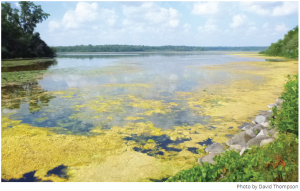Phosphorus is natural and essential, but when present in excess it can cause algal blooms, fish deaths, and decreases in water clarity. Phosphorus is currently one of the biggest challenges facing Lake Wingra so it’s time to get creative about finding solutions. Through my graduate studies at UW-Madison, I had the opportunity to design an experiment with a group of classmates. After talking with fellow board members, I decided to look at using plant islands to remove excess phosphorus from the lake system.
Current best management practices for phosphorus focus almost exclusively on prevention. Once it enters a system, there are few strategies to remove it. Phosphorus is crucial for plant growth – thus the reason it causes so much algae. Our study aimed to redirect that growth toward other types of plants and divert the excess nutrient load out of the water. We hoped to increase the financial viability of plant islands at a large scale by focusing on food plants. Here in Madison, a farm to table restaurant may someday be pleased to sponsor their own plant island on Lake Wingra to both help the environment and make their salads.
In our study, we created islands that allowed plants, like leaf lettuce and peace lilies, to float at the water surface so only the roots were submerged. This set-up ensured that the plants’ only source of nutrients came from the water below. Using water taken from Lake Wingra, we measured plant growth and decreases in phosphorus over a 5-week period. Our results were inconclusive due to the detection levels of our testing methods, but we did see noticeable plant and root growth, indicating there was nutrient uptake.
This experiment can be used as the proof of concept to move forward with a larger project. One potential for this is to make a floating island with more plants and deploy it directly into Lake Wingra. While lettuce does provide an additional food source, it may be more prudent to select a hardier plant which could survive being more exposed in the lake. We do believe this project has a lot of potential, but there are some potential challenges. For instance, it would be important to select a plant that has minimal opportunity to spread off the island, so as not to create and entirely new problem! But, plant islands could be an innovative and economic new strategy for mitigating a significant threat to our lake.
-By Ian Krauss

